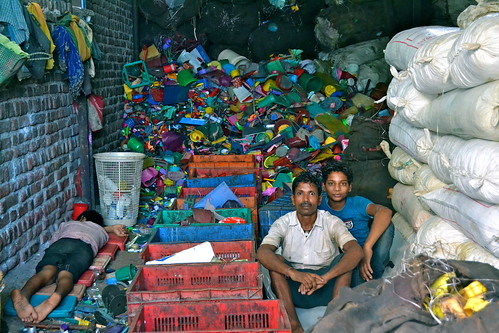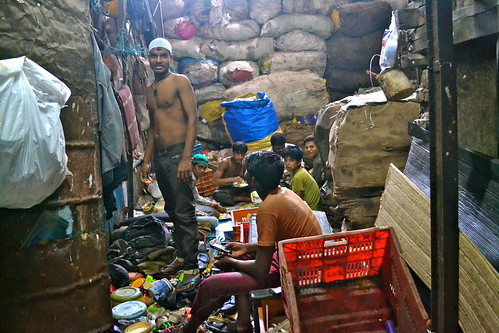In a city where all the Bollywood stars live, Amitabh Bachan, Shah Rukh Kahn, Salman Khan and more, it’s quite paradoxical to observe that the ones who show off all their luxuries do not actually have much happiness, and the ones that live the happiest lives are in the slums of Dharavi, they are the true stars, living in their own luxury!
Walking around the slum of Dharavi, the slum that was shown in the movie “Slum Dog Millionaire”, I saw how life was being recycled within this unbreakable community. This slum system of Mumbai is one of the largest in Asia, it houses about 1 million residents and such a slum has an economy worth more than that of south Mumbai, approximately $500 million! How is this possible I asked, when we see and think of slums we think of the poor who do not have food and are miserable, right? But NO, when I visited I saw the opposite! I walked in and out of little dark allies and shack, up and down ladders, walking and crawling from one shack to another through underground and rooftop pathways, quite a maze! Plastic cans, bottles, containers, plumbing pipes every where, sorted by colors, shapes, and material. Your thinking, so what, right? Well listen to this.
Recycling Mumbai’s waste is the magic of the little hands of the kids living in this slum community, where they sort, melt, and recycle Mumbai’s trash. This is their life! They make the cheapest and most useful items that we buy in the markets of Mumbai. Everything from toys to sunglasses to shoes, souvenir and all the items that make us happy, while their happiness lies in the little that they have. Life is constantly being recycled within this slum, one life is gone and another begins. Currently the second generations resides there. Recycling is not only saving the material of Mumbai but it’s also saving the lives of the residents of the Dharavi slum. The people of the slums of Dharavi make a living by helping Mumbai go Green! By helping the city recycle, the residents of the Dharavi slum are recycling their lives.
What about child labor? Yes, its a huge part of this community, the tour guide as he took us into the slum stated, “Now let’s have a look at child labor”, he said it as if it were some form of art, something that they are proud of in a way. His tone really made me mad! As we walked through the dark alley into the plastic recycling center, I saw a group of boys, around the age of 10-20 sitting in a circle in the middle of the mud shack surrounded by colorful plastic waste, taking a lunch break, devouring the dhal (lintels) and rice. They were all shy, didn’t really respond when I asked them questions, it was more of the tour guid taking much of their spotlight, sometimes maybe exaggerating the situation to make their lives seem more dramatic and appealing to the tourists. These kids were born and raised there, and they earn their living and die in this slum. No one can take them out and they themselves don’t want to leave.
From the perspective of others in the city of Mumbai, they tell us that these kids have it good. They say they have a great skill, a skill that earns them enough to live a happy life, but in my head all I could think was, what if they went to school to enhance these skills? They could be working in big companies and could get out of the slums. But I am way off in my thinking. These kids don’t want to leave the slums, they are happy, they are not being forced nor abused. Coming from a country where all the luxuries are right in front of me I guess sometimes its hard to see such situations, we try to compare our happiness with theirs. This lifestyle is what they know and if they are happy than as the Hindi song goes “ALL IZ WELL”. All we can do is pray for them! Never compare what makes you happy with what makes others happy. We can’t expect to go around the world and change peoples lives if the outcome consists of them being unhappy. Lesson learned!
Sujita ✌
Posted By Sujita Basnet
Posted Jul 14th, 2013



